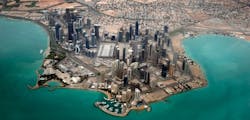DOHA, Qatar - Qatar has joined efforts underway by other Middle Eastern nations such as Saudi Arabia and the UAE to bring down the energy consumption of desalination plants.
Water producer Qatar Electricity and Water Company (QWEC) and Qatar Environment and Energy Research Institute (QEERI) have signed a Memorandum of Understanding (MoU) to install desalination pilot tests.
The research will address both membrane and thermal desalination processes – the latter accounting 99% of municipal water supplied to Qatar.
The Reverse Osmosis (RO) pilot test would be used to develop and optimise pre-treatment processes to ensure "reliable operation in desalination facilities, even during algal blooms, and the exceeding of the boron concentration in the RO permeates".
The Multi Effect Distillation (MED) pilot test would be used to develop a proof of concept of patented ideas that reduce the energy consumption and improve energy efficiency of MED technology, QEERI said.
QEWC’s site at Dukhan coast will be used to secure the intake/outfall facilities and the electricity required to operate both RO and MED pilot test continuously.
The Dukhan site was previously used by QEWC for a small scale RO project to treat seawater for use as boiler feed water (read WWi article).
QEERI said “desalination methods used in Qatar and most of the Gulf Cooperation Council region are energy intensive and thus the desalted water is expensive”.
Dr. Khalid Al-Subai, acting executive director at QEERI, said: “This agreement with QEWC is crucial to test some of the processes developed by QEERI that can radically reduce the cost and energy use of current desalination methods.”
###
Read more
Will Qatar turn the Arabian tide to RO desalination?
Qatar progresses with wastewater reuse plan
Qatar wastewater contract worth 300m sees FCC enter country and fend off Spanish competition




